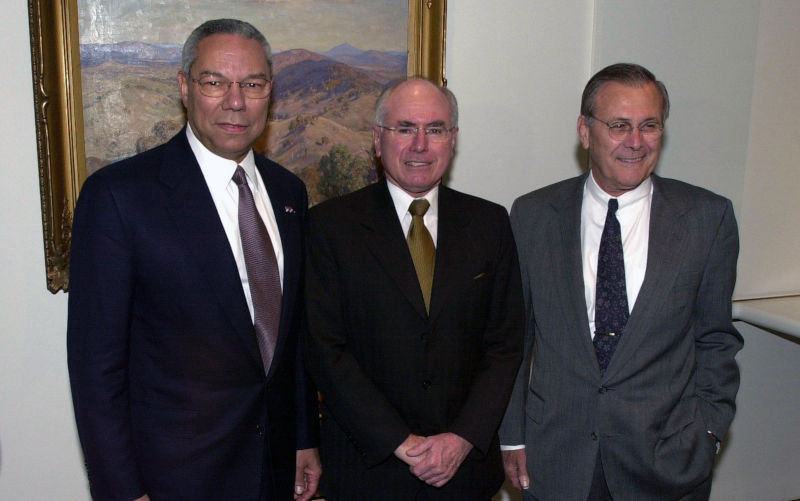Howard still ducks Iraq question
January 28, 2024
Former prime minister John Howard has defended his record on committing Australia to the Iraq war. But we are no closer to fully understanding his reasons.
Former Prime Minister John Howard’s response (The Australian Financial Review letters, January 15) to my column in these pages on January 8 offers an important opportunity for Australians to give new thought to how its government decided to go to war in Iraq in 2003.
At the very least, Howard’s reaction reveals a certain willingness to offer a more considered post-war analysis of the decision than that reached by the Bush administration.
With Howard’s encouragement Australia can now do far better than huddle beneath the tattered banner of ‘‘mission accomplished’’.
If the Albanese government takes the opportunity – though that seems highly unlikely – the nation can consider the processes that led Australia into this disastrous war.
This would be important education for handling future crises.
But Howard is still inclined to duck the central issue, namely that in his rush to support George W. Bush in 2002 the normal internal processes of good government were discarded.
Instead, in his response to my article he claimed that the officials I cited, former Department of Foreign Affairs and Trade and Defence Department secretaries Ashton Calvert and Ric Smith respectively, had each confided to him later their support for his stance.
That is not good government and while it may have suited the likes of a Scott Morrison, Howard should have known better, especially given the pride he took in his studied management of the cabinet process as prime minister. It matters little what senior officials said to Howard after the decision.
And my column did not say that Ashton Calvert regretted the policy: he was firm to the end that it was correct.
It matters that advice was not sought.
It has long been known that Australia was involved in military planning for the Iraq war well before the matter went to the Howard cabinet for decision.
A vital question, therefore, is to what degree did the Australian government informally communicate to the Bush White House that it could count on Australian military participation in Iraq before the formal American request was made?
If it did, this would shed a far different light on the government’s formal public position that it was agonising over the decision to commit right up to when it was officially taken in March 2003 – or, to use Howard’s own words, that he was keeping his ‘‘options open until the time when a final decision was needed’’.
Other facts that have to be recalled include the widespread doubts about the existence of weapons of mass destruction. Those doubts were not exclusive to the Labor Party.
Further, that UN weapon inspectors were correct from beginning to end that no WMD would be found.
Howard was clear throughout this process that his endorsement of US policy was essentially about the US alliance. Indeed, he called in the alliance as the decisive factor, as distinct from the moral and military needs for committing.
He said in 2003 ‘‘this is not just another story in the alliance. People who say, if we hadn’t supported the Americans on this it wouldn’t have made any difference, don’t understand how important it was to the Americans’’.
In so far as its importance to the Americans in being able to show it had Australian support, that is correct.
Still, Howard got Australia off with no casualties, at least in the initial phases of the war.
Was this part of the deal from an early commitment?
We need a realistic and nonpartisan review of the war to find how the Howard government got into and perhaps encouraged a tragic and costly mistake.
This is the big issue, but there are two points I might add specifically about the former prime minister’s response to my article.
Howard also took issue with my characterisation of former US Secretary of State Colin Powell’s position on the war, namely that he was opposed.
I will concede he is correct that this particular point was overstated, but it should not be forgotten that Powell told Bush on August 5, 2002, in a version of the so-called Pottery Barn rules, that ‘‘you break it, you are going to own it’’. That’s hardly the advice of an enthusiast for war.
Moreover, journalist James Mann’s respected study of Bush’s war cabinet stressed that within the administration throughout much of 2002, Powell was articulating the same kind of scepticism being advanced publicly by president George H. W. Bush’s national security adviser Brent Scowcroft. Much to the chagrin, if not rage, of the Bush White House, Scowcroft had warned publicly in August 2002 of the risks of going to war in Iraq.
Powell, as Mann shows, ‘‘was not opposed in principle to military intervention in Iraq’’, but he saw ‘‘the important questions [were] how and when to intervene, with whom and how to clean up Iraq afterward’’. And as the New York Times later reported, Powell said in 2005 that backing the war would remain a ‘‘blot’’ on his record.
Howard also underlined the importance of Bush telling him in September 2002 that the US was going to seek a further resolution in the UN Security Council. But it was later revealed that British prime minister Tony Blair’s private secretary wrote to his counterpart in foreign secretary Jack Straw’s office on October 17, 2002, saying that ‘‘we and the US would take action’’ in Iraq even with no new resolution. A possible second UN resolution, primarily Blair’s initiative, was supported by Australia but not with the same vigour as Whitehall.
James Curran is the Financial Review’s international editor
First published by the Financial Review eEdition January 22, 2024


